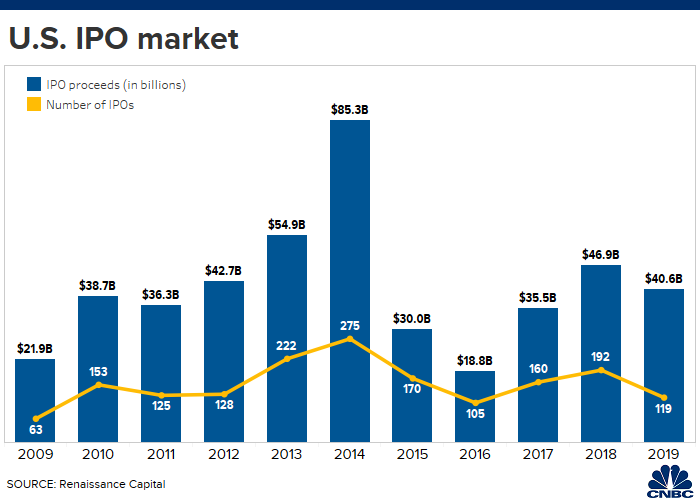Recent highly publicized flops by supposedly disruptive companies could be painting an unpleasant picture ahead for innovation, at least in how it’s viewed in the financial markets.
Investors have turned thumbs-down on high-profile companies including WeWork, Uber and Tesla. Industries including marijuana, vaping and bitcoin all have seen big price drops following a spate of bad headlines. Even Netflix is under pressure, with competition rising and the company’s moat no longer so deep.
Multiple initial public offerings have gotten trashed, most recently exercise bike maker Peloton, which tumbled 11% in its opening day on the market Thursday and fell another 3.5% Friday.
It either could be a temporary blip ahead of some industry shake-outs, signs that deeper distress is ahead as investors demand more than flavor-of-the-week innovation, or simply the market engaging in healthy price discovery after a period of overexuberance on unicorn companies.
“Now, the easy explanation here is that all these are examples of capital markets mispricing, bursting bubbles one and all. The ingredients that go into investment manias are certainly all there: group think, focus on price momentum over fundamentals, and belief in the ‘greater fool,'” Nicholas Colas, co-founder of DataTrek Research, said in a note.
However, while he said that’s “a perfectly good rearview mirror take,” the issue runs deeper.
Need a story ‘to believe in’
“When it comes to ‘platform’ companies, venture capital has done a generally terrible job building these businesses into viable companies,” Colas wrote. “WeWork, Uber and Lyft raised a combined $43 billion from VCs. Yet for all that capital, none of these companies developed a business model that could reliably generate profits or even show meaningful progress to that goal without a deus ex machina innovation like self-driving cars.”
The development comes amid a blockbuster time period for venture capital and private equity.
VC has seen its assets about double over the past five years to some $856 billion and now comprises about 14% of the $6.1 trillion global private equity space, according to industry tracker Preqin, which estimates that AUM will hit $1 trillion over the next few years.
In addition to the surge in assets, average transaction size has surged, from $6.7 million in 2013 to $23 million in 2018, and the amount of megadeals of more than $1 billion exploded to 24 in 2018 against zero five years ago. WeWork, the office space company whose initial public offering has run into major complications, was the biggest such VC deal in the first half of 2019 with a value of $2 billion. Uber was the biggest exit, valued at $14.7 billion.
Former Nasdaq CEO Bob Greifeld said the IPO market at least shouldn’t be written off too quickly, despite this year’s difficulties.
“When I hear and read about what’s wrong with the IPO market, I think the goalposts are moved very high,” Greifeld, now the chairman of Virtu Financial and a CNBC contributor, told CNBC’s “Squawk on the Street.”

Still, he said private companies with disruptive technologies looking to come to market should take heed of recent developments.
“I think the path of profitability has to be fairly clear right now,” Greifeld said. “It has to be a line that you can see and not just a story that you have to believe in.”
The stories of each disruptor that has run into trouble have played out differently.
Market has to work it out
For WeWork, valuation came into play for a company that appeared to be a disruptor but wasn’t. Uber and Lyft face regulatory and reputation issues. Tesla and Netflix have tough competition from deep-pocketed rivals, while vaping and cannabis have legislative hurdles.
In Peloton’s case, one issue is that the company just might not be profitable, though the company’s CEO, John Foley, told CNBC in a Thursday interview that he expects to see a profit in 2023. “We are investing and we’re in investment mode and we are prioritizing growth over profitability right now,” Foley said.
The market is busy sorting it all out, and that is not a bad thing, said Carol Roth, a former investment banker and head of Intercap Merchant Partners. Roth said she and others have been warning about valuations, citing Peloton specifically.
“Investors took heed of those warnings and pushed back,” she said. “That’s what should happen. Unfortunately, it didn’t happen for some of the companies that made it public, and their prices have suffered.”
But while Roth thinks the individual companies that have been overvalued could get hit, the damage she sees will be on an individual basis and not a deeper sign that something is wrong in financial markets on a macro level.
“This shows that Silicon Valley has gotten silly and they’ve gotten silly in some of their valuations that they’ve given companies, the lending of the tech halo to companies that are not tech, companies pretending to be tech companies and trying to inflate their valuation,” she said. “I think you’ll see a fallout in the private market but I don’t think it speaks to any underlying economic issue.”
